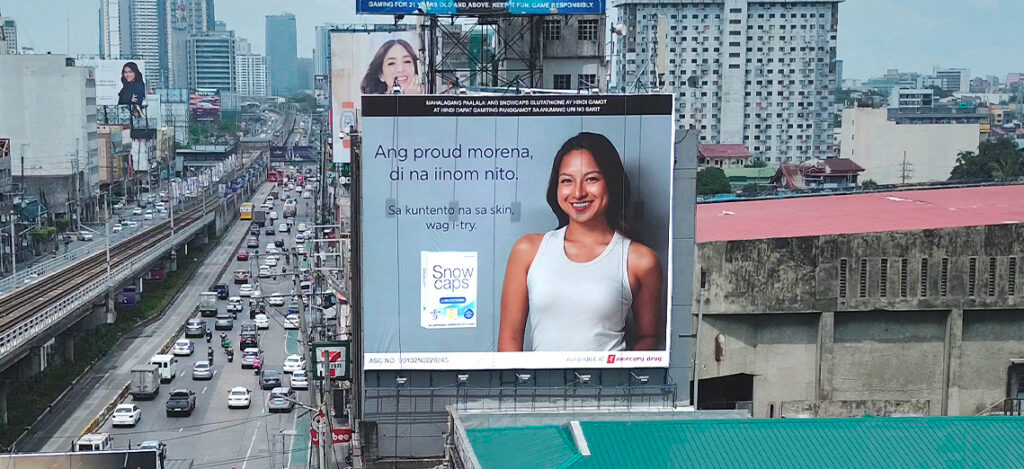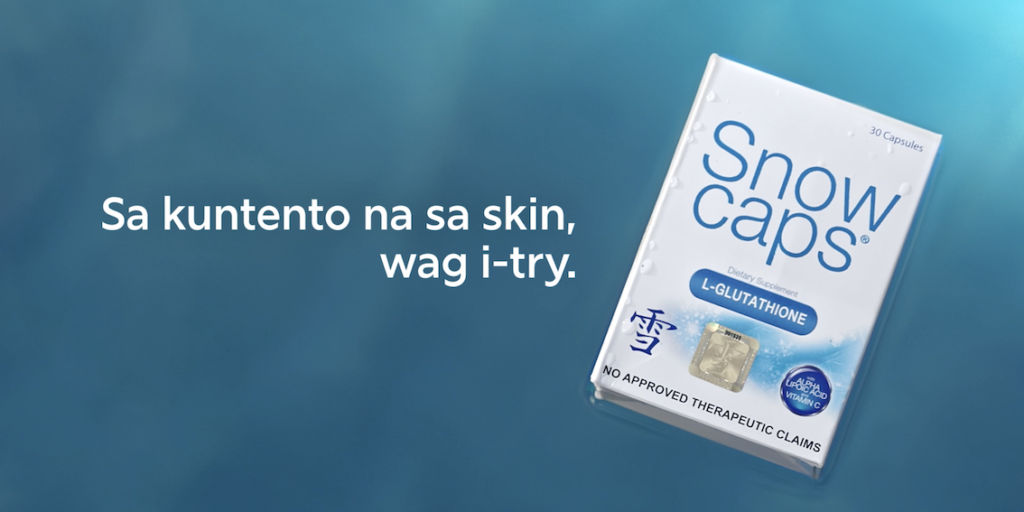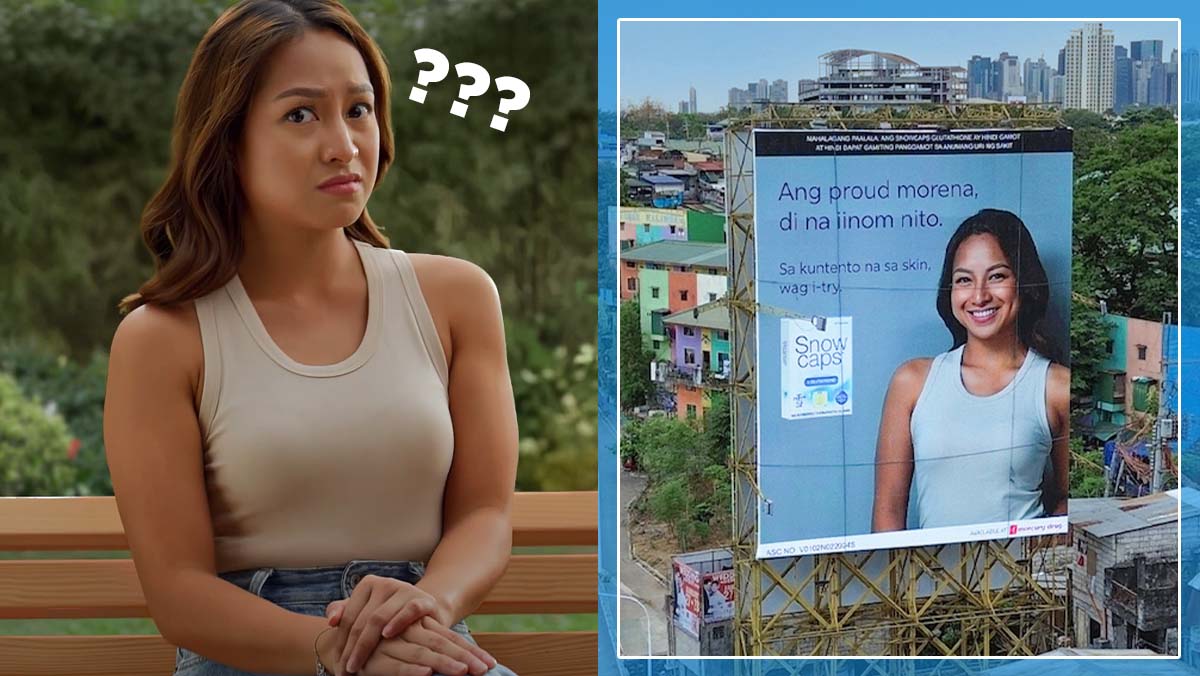Recent ads from SnowCaps L-Glutathione in the Philippines have stirred up quite a storm in social media after an image of its billboard featuring a morena woman with the copy “Ang proud morena, di na iinom nito. Sa kuntento na sa skin, wag i-try” went viral. In English, the ad copy roughly translates to “A proud brown-skinned person won’t drink this. If you’re content with your skin, don’t try it”. This is just one of the series of ads that the brand created in partnership with independent Manila creative shop Leron Leron Sinta. The main material is a one-minute digital film entitled Skin, which has now reached over a million views on Facebook:
In the video, you’ll find proud morenas and a moreno flicking away the product as they share their own reasons why they don’t need it. If taken as is, it does look like a tongue-in-cheek ad that is far from traditional skin-whitening ads in the Philippines. I actually chuckled when I saw it for the first time as I asked myself “What were they thinking?” because it does look like a self-degrading joke – empowering people who are proud of their skin color while promoting a whitening product. How are they planning to sell their whitening dietary supplements? It’s like a whole new level of reverse psychology that I haven’t seen in ads yet – at least in the Philippines.
According to a press release, SnowCaps describes the film as a “significant departure from traditional skin-whitening ads in the Philippine,” which is obviously true.
Erick Armigos, Chief Executive Officer of Vida Nutriscience, was also quoted as saying: “For too long, the beauty industry in the Philippines has perpetuated a narrow definition of beauty… We believe true beauty comes from within; if you’re already happy with your skin, don’t use SnowCaps L-Glutathione. But if you want to experience its effects, try our product.”

We don’t often get “empowering” words from a whitening brand, so why are people offended? Let me try to briefly explain because there’s also part of me who sees the other side. Using a morena in their ads is like a double-edged sword. While at first glance, it seems harmless, there are people who take this as an underlying intent to target insecurities that have long been ingrained in our brains — the whiter, the better. If it’s all about empowerment, why didn’t the brand also include those with darker skintones or even those who already have fair skin but still want to make it even lighter a la KPOP idols? I can almost hear the brand saying that it’s because this is the common skintone for Filipinos, but maybe – just maybe, featuring all skin colors might have been a better move? There’s also another side that I’m seeing online — that such approach wouldn’t be acceptable if it was framed as a slimming pill targeted towards thick ladies who are proud of their curves, which actually makes sense. It does sound offensive in a discreet way. But anyway, adjusting it or not, the whitening category remains to be a very controversial space. Whatever they say or do, there will always be part of the population who would hate the idea of promoting whitening.

Although more than offended, I believe people are now more confused on the brand’s message: Should we be contented or should we aim to whiten our skin? And I think this is also part of what SnowCaps seeks to happen: Question ourselves and leave the decision to us, their consumers. How we react to their series of ads is completely out of their control. The ads have also been approved by the Ad Standards Council of the Philippines – the regulating body in charge of screening advertisements before they go public. The fact that it got approved at this level means that the brand has enough substantiations to support their claims, whether done ethically is another question.
Despite the mixed reactions, it’s evident that the ads have succeeded in sparking conversation and grabbing people’s attention. While some criticize its approach, others applaud its “bold move” to go against the norm. As one commenter pointed out, any publicity is good publicity, and the fact that people are talking about it means that the brand still wins in terms of ad reach. I’m curious if it will translate to sales, though?
Personally, I still advocate for letting people do what makes them happy. I have friends who hated their skin color because they’re the only ones in the family who are different in terms of genetics. I know people who have a fair skin but would still go to the tanning salon every now and then. While perception of beauty may vary due to different factors, let people be. Let them do what makes them happy.
I’d still choose this kind of approach over the tone-deaf ‘Pandemic Effect’ ad or another brand that uses black face for their ads any day.
For updates on our latest discoveries within (and outside) the Metro, don’t forget to follow Manila Millennial on Facebook, YouTube, or Instagram. Keep safe, everyone!



For me naman po depends pa din sa bawat opinion dahil may kanya kanya tayong pananaw sa buhay
Sa tingin ko po di naman xa offensive na sabi nmn sa tag line kung proud morena wag na ito itry..may choice tayo kung bibili o hindi ng product..at piliin natin kung ano ang mgpapasaya satin .
Morena/moreno at Hindi
Pwede naman siguro iinom nito
Pero depende pa din sa atin yan ,kahit ako i love being Morena ❤️